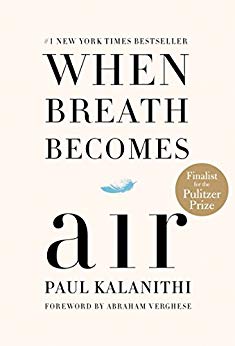

This article is an excerpt from the Shortform summary of "When Breath Becomes Air" by Dr. Paul Kalanithi. Shortform has the world's best summaries of books you should be reading.
Like this article? Sign up for a free trial here .
What are books published posthumously, and what kind of books are usually published in this way?
Books published posthumously are books that are published after the author has died. Though they are commonly about the experience of the end of life and thoughts on dying, that is not always the case. Books published posthumously can range in genre and subject matter.
When Breath Becomes Air is one such book. It’s a memoir that details Dr. Paul Kalanithi’s experience with cancer.
After Death: An Epilogue Written for Posthumous Publication
Shortform note: Paul’s wife, Lucy, made sure that it would be one of the books published posthumously, and would live up to Paul’s legacy. Below, she details some of the things she hopes Paul left behind, including the book published posthumously that examines the meaning of life.
The final pages of When Breath Becomes Air are written by Paul’s wife, Lucy. She describes how Paul died on March 9, 2015, in the hospital with his loved ones by his side. Cady was eight months old.
Paul’s treatment stopped working a few months earlier, at Christmas. He became weaker but kept living as best as he could. They had friends over for dinner, played with Cady, and continued to enjoy each other’s love and companionship. Paul also worked on this book. During his last months, finishing the book was of the utmost importance to him.
The transition to spring brought a resurgence of life in the natural world while Paul’s life continued to wane. In February, he was put on oxygen to help his breathing. More scans were done, showing the growing grip of the cancer in his lungs and the spreading of it to his brain. The new brain tumors brought a shortened life expectancy and would eventually lead to neurological deficits.
The ensuing deterioration of his mind was particularly crushing for Paul, fearing the loss of meaning and independence. Thwarting these devastating effects became the main goal of whatever treatment he would receive.
Lucy remained strong for Paul, but on the inside, her heart was breaking. She didn’t know how much time they had left together, but she never thought it would only be a matter of days.
For his final weekend, Paul’s family came to their house and spent time with him and Cady. Paul knew he wasn’t likely to finish his manuscript either due to time or his physical capacity. But he still put it aside that day, preferring to be present with his family.
The family was hoping Sunday would bring more of the same. More time to relax and enjoy each other’s company, maybe go to church. But Paul spiked a fever and slept for most of the day. By Sunday night, Paul’s health took a dramatic turn. He couldn’t breathe and was taken to the ER. He knew, as they all did, he was unlikely to leave the hospital again.
The doctors suggested intubating him, and Paul and Lucy discussed and struggled over the decision. Intubation would keep him alive, but at what cost? Could his current ailments improve to a point where he could come off ventilation? Or would he continue to deteriorate, his brain and organs shutting down?
The other option was comfort care, an action that was certain to lead to rapid death. Paul’s main question regarded his quality of life even if he was able to recover from the respiratory issues. With the cancer in his brain, was there a good reason to lengthen his time if he would not be lucid enough for it to have meaning? He signed a “Do Not Resuscitate” and decided to sleep on it.
In the morning, his attention turned again to comfort care and the possibility of dying at home. But Lucy knew his condition was delicate and that he might not make it home. It was decided that she would bring home to him. The only thing he wanted was Cady.
Paul lay with Cady in his arms while the doctors commiserated over what was left to do. But Paul knew what he wanted. He turned to Lucy and said, “I’m ready.
Surrounded by his family, Paul became emotional as he communicated his love and gratitude. Before the supplemental oxygen was removed and morphine injected, Paul asked his family to ensure this book was published. He also told Lucy he loved her one final time.
After another hour, Paul drifted into unconsciousness. Eventually, he inhaled and breathed out the last breath he would ever take.
The Power of Books Published Posthumously
Shortform note: When Breath Becomes Air became one of several books published posthumously that examines life and death. Lucy, Paul’s wife, thought its status as one of the books published posthumously paralleled with Paul’s life; left unfinished and full of potential.
Although Paul’s manuscript was not complete when he died, Lucy sees the correlation with his unfinished life. The book, like Paul, did not get the time it deserved.
He’d started the manuscript over the last year, writing with fervor every chance he had. He wrote while he was still finishing his residency. He wrote at night in bed. He wrote while waiting for his doctor appointments. He wrote and communicated with his editor while receiving chemotherapy.
Like the final year of Paul’s life, this book carries a sense of urgency. There was a desire to communicate everything he’d learned as a doctor and patient about life, death, and meaning under a ticking clock counting down the minutes until he could say no more. He couldn’t help people as a doctor anymore, but he still wanted to guide them through that threshold he’d helped so many walk through.
As he’d done for most of his life, his writing examines mortality and what it means to live with meaning. He wanted to face his mortality with grace, and he wanted to help others do the same.
Both Lucy and Paul recognized that his cancer saved their marriage. It brought them closer together, each wanting to secure a positive future for the other. Paul’s family was also a source of strength, supporting them through his treatments and their decision to have a child. Their lives were filled with love, and despite the sorrow, Lucy knows they were lucky for what they had.
Paul’s ability to meet death and accept it allowed him to have courage and integrity throughout his illness. Rather than fighting against reality or praying for a Hail Mary, he mourned the life he knew was out of reach and did his best to recreate something else in its place. Even when the illness was breaking his body down, his spirit was never broken. He sought meaning in what was left of his life.
That Paul is the one Lucy misses—the man who never gave up and who never stopped living.
Lucy knows that if Paul had survived, he would have contributed greatly to his field and medicine as a whole. Whenever she sees the hospital where he worked, where their daughter was born, and where he died, she thinks of all the people he would have helped. But in writing this book, she knows he will still contribute, still help, in a way that is uniquely Paul.
Lucy says the years since Paul’s death have been hard. Some days, her grief is so severe, she is inconsolable. But she’s also found beauty in remembering their love. She’s had to contemplate life and death every moment, and in doing so, she’s found peace and appreciation for what they shared. She says she didn’t expect to feel the power of love intertwined with her grief, but she does. She continues to love Paul with the same depth as she had when he was alive.
Paul was buried in the Santa Cruz Mountains in Northern California. From this plot, the ocean and coastline are in view. Lucy goes there frequently, bringing along a bottle of wine and reveling in her memories, many of which are held within that same environment.
The earth above Paul continues to grow and morph as the laws of nature progress. Each season brings a regrowth and a reminder of the unending connection between life and death.
The integrity Paul showed throughout his illness, and especially in those final months, was not limited to his life with cancer. He lived his entire life this way. He faced death daily and sought the answers to how to live despite it. Lucy believes that Paul’s illness was devastating, but his life was not a devastation. He wondered whether it was possible to hold life and death in his hands and still live a meaningful and graceful life. Lucy knows the only answer possible is yes.
Shortform note: Paul Kalanithi’s book is one of many books published posthumously that strives to find purpose in the author’s final days, and in this case, his family hopes to find meaning in their grief, Paul does not lament on his loss, but instead consistently reframes how he sees the meaning of life- even as he writes a book that will be in the category of books published posthumously. In Paul’s writing, the book is a reflection on life and death, and what it means to be a gatekeeper of those ideas. The book, published posthumously in 2016, was a bestseller.

———End of Preview———
Like what you just read? Read the rest of the world's best summary of Dr. Paul Kalanithi's "When Breath Becomes Air" at Shortform .
Here's what you'll find in our full When Breath Becomes Air summary :
- How Paul Kalanithi discovered he had cancer
- How Paul coped with his cancer until his very end
- How Paul's wife dealt with his death and found the strength to continue






